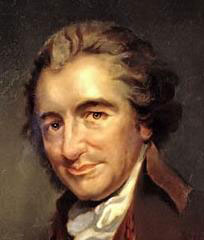Thomas Paine
Thomas Paine (1737-1809) was an English author, pamphleteer, radical, inventor, intellectual, revolutionary, and one of the Founding Fathers of the United States. Born in Thetford, England, Paine emigrated to the British American colonies in 1774. His principal contribution was the ‘Common Sense’ (1776) – the famous treatise that advocated colonial America's independence from the Kingdom of Great Britain. ‘Common Sense’ was so influential that John Adams said, "Without the pen of the author of 'Common Sense,' the sword of Washington would have been raised in vain.” Paine lived in France for most of the 1790s, becoming deeply involved in the French Revolution. He wrote the Rights of Man (1791), in part a defense of the French Revolution against its critics. His attacks on British writer Edmund Burke led to a trial and conviction in absentia for the crime of seditious libel. Despite not speaking French, he was elected to the French National Convention in 1792. The Girondists regarded him as an ally, so, the Montagnards, especially Robespierre, regarded him as an enemy. In December of 1793, he was arrested and imprisoned in Paris, then released in 1794. He became notorious because of The Age of Reason (1793–94), his book that advocates deism, promotes reason and freethinking, argues against institutionalized religion and Christian doctrines. He also wrote the pamphlet Agrarian Justice (1795), discussing the origins of property, and introduced the concept of a guaranteed minimum income. In 1802 he returned to America where he died in 1809. Only six people attended his funeral as he had been ostracized due to his ridicule of Christianity.
|
